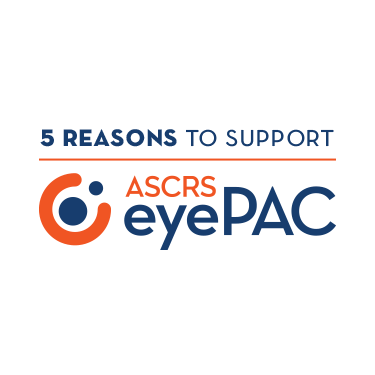ASCRS Joins Surgical Coalition in Urging Congress to Take Immediate Action to Prevent the Proposed Medicare Physician Payment Cuts; Ask Your Representative to Sign the Bera/Bucshon Congressional Sign-on Letter to House Leadership
On Friday, September 18, ASCRS joined the Surgical Coalition in a letter to every member of the House of Representatives urging Congress to take immediate action in the continuing resolution (CR) or other must-pass legislation this year to prevent the proposed Medicare physician payment cuts scheduled to take effect on January 1, 2021.
The letter outlines the policies included in the Medicare Physician Payment Proposed Rule for 2021 that will have a devastating effect on specialties, like ophthalmology, due to the budget neutrality requirements. Those policies include the creation of an unjustified add-on code to provide additional payment to primary care and certain specialty visits and the refusal of CMS to apply the same E/M stand-alone visit codes to post-op visits included in the 10- and 90-day global services.
The letter also refers to the congressional sign-on letter led by Representatives Ami Bera, MD (D-CA), and Larry Bucshon, MD (R-IN), as well as Abby Finkenauer (D-IA), George Holding (R-NC), Brendan Boyle (D-PA), Brad Wenstrup, DPM, (R-OH), Roger Marshall, MD, (R-KS), and Raul Ruiz, MD, (D-CA) urging congressional leadership to act this year to prevent the cuts. We ask House members to sign the letter and support our efforts to stop the cuts. A Dear Colleague letter will be sent to House members on Monday encouraging them to sign the letter.
Please use the ASCRS Grassroots Action Center and send a letter to your representative asking them to sign the letter. The background information, along with the Bera/Bucshon and Dear Colleague letters, as well as a letter for you to send, are provided to you. If you have any questions, please contact Nancey McCann at nmccann@ascrs.org.
White House Releases “Most Favored Nation” Drug Pricing Executive Order
On September 13, the White House released its latest executive order (E.O.) on drug pricing that would ensure that Medicare pay no more than the lowest price that a drug is sold for in any Organisation for Economic Co-operation and Development (OECD) country with a comparable per capita GDP. The E.O. directs the U.S. Department of Health and Human Services (HHS) to immediately begin a demonstration project to test the “most favored nation” approach under Medicare Part B. A similar model would be implemented for Medicare Part D for those products without competition for which patients pay prices higher than in comparable OECD nations. The President had previewed a version of the directive last month but provided industry time to propose an alternative policy before moving forward. However, the deadline passed, without pharmaceutical companies and the administration reaching an agreement on an alternative plan.
House to Remain in Session Until COVID-19 Relief Agreement; Congress Continues Work to Fund the Government
As we have reported, negotiations on a COVID-19 relief package have been stalled for the last month due to the failure to resolve disagreements about total spending levels, as well as additional aid to state and local governments. Earlier this week, Speaker of the House Nancy Pelosi (D-CA) announced the House will not go home for the elections until congressional leaders and the administration can negotiate another COVID-19 relief package, and the president signaled a willingness to get an agreement. Even if House members are in Washington past their scheduled October 2 departure date, Senate Majority Leader Mitch McConnell (R-KY) indicated they are now looking at leaving for their originally scheduled October 9 break – at the end of next week after Congress passes the stopgap funding measure.
On September 15, in an effort to push a compromise between the administration and congressional leaders, the 50-member bipartisan Problem Solvers Caucus released a $1.5 trillion COVID-19 relief proposal. The proposal is halfway between the House Democrats' $3.4 trillion proposal, and the $500 billion proposal from Senate Republicans.
Congressional leaders are still planning to keep COVID-19 relief separate from their efforts to fund the federal government before the end of the fiscal year on September 30. Democratic leadership and the administration have agreed to a “clean” continuing resolution (CR) – stopgap funding measure - with a vote likely in the House next week, followed by the Senate. However, it is unclear whether it will be through December 18 or next year and whether funding for expiring health and other programs, which have been subject to short-term extensions and are expiring November 30, will be considered.
ASCRS and the surgical coalition continue to urge Congress to take immediate action – in the current CR or other must-pass legislation this year - to prevent the pending Medicare physician payment cuts scheduled to take effect on January 1, 2021.


